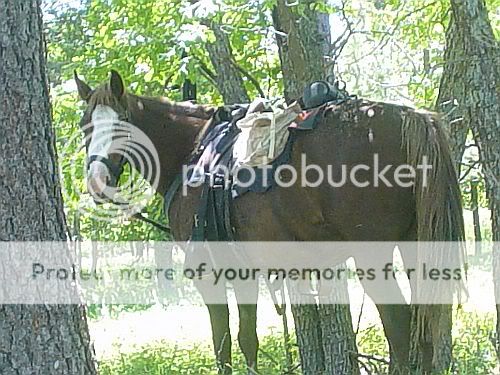Far be it for me to give you some advice! (10 words)
This is the definition of a "FARB." (All CW Reenactors know what I mean!!!)
I will NOT be critical of you. I ALWAYS wanted a horse, since I was 5 years old. My parents wouldn't buy me one, though we were 5 minutes away from a reputable stable, so I worked and bought my lessons. I REALLY READ anything about horses I could get my hands on, and DH and I bought our first horses almost 25 years ago, in 1985. I wouldn't begrudge anyone their love. If your wife really wanted one, then you both should make a go of it.
Nobody that thought I would lose interest is saying anything about my dedication now. I had to drive out to care for my little herd for 14 years, many times in the winter without anyone else on the road with me because of bad weather. I've had them in the back yard for one decade now, and I've never looked back.
THAT BEING SAID...I, too think that this horse is in a better place now. I agree with getting a Vet, getting lessons, and reading about your purchase. My mare, "Moon Eyes" (below)
is unusual because she tells jokes. Her favorite?:
You can tell a horse person...
But you can't tell them much!!
(pretty funny, that)
DON'T be discouraged. Here's MY advice:
1) Get a rubber feeding bucket (it has no hardware on it, see?)
http://www.enasco.com/prod/images/products/5F/AC058074l.jpg
and give him the same water that you drink. Honestly, just like a little algae won't hurt your chickens, it won't hurt a horse, either. You can get VERY TIRED, constantly making your horse's water bowl super clean--less time to play with your horse, I say! The pool water is not the same as a pond. My "city water" has chlorine in it, but it's got less than the chemicals you put into your pool
2) Horses require 1 lb of hay/100 pounds of horse
Average horses eat about 3 flakes of hay/2 times a day. If you plan on 1 bale of hay per day, you'll have an adequate sufficiency. If your horse really is underweight, your Vet will most probably suggest more hay first, a supplement second. Horses have small stomachs that empty quickly. They are designed to eat many small meals per day, but they can tolerate 2 feedings per day. It's pretty obvious, feed less if your horse doesn't clean up the feeding, feed more if he's looking around for food.
3) CAREFUL about putting weight on a horse. If you can see the ribs, but there's a covered topline, and good padding on the chest and backside, the horse is in good weight. You can founder or colic a horse by giving them extra calories. Weight needs to be gained gradually--Your VET will give you good advice on this horse.
4) (You're not gonna like this one) It's possible that your horse IS underweight and managable because he's weak--you didn't give us any pictures to go by. His manners need to be worked on. Better to take the perfectly mannered horse and test them, than to find out that you bought a monster AFTER you've made him healthy. Test on the following:
(a) obediant to haltering/tying
(b) obediant to picking out feet
(c) obediant to saddling
IF you're not sure about (c), pay for a trainer to come out and try him. The money you spend with the trainer will save one of you a hospital visit.
I bought this "mare from hxxx" a few years ago. She seemed to have a timer on how long I could work her, so I took her to my Amish farrier/horse trainer. Had to go get her after she spun and tried to kill him. She was ONLY 14 hh even. I've gotten REALLY FUSSY about the horses I buy now, and the most recent purchase is the 35th horse I've owned.
Hope this helps! Good luck, and PM me with any questions!
 but I also sought advice from the 'horse-people' around here and lined up a super equine vet.
but I also sought advice from the 'horse-people' around here and lined up a super equine vet.






